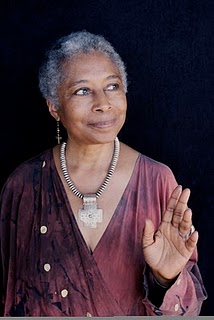 |
 |
Reclaiming the Crossroads
An old friend was upset because she saw a photograph of me wearing a cross. That's a cross! She said with fear. As if she thought I had regressed into something dangerous. And your earrings, she said, are little crosses! She was alarmed. The cross has always preceded torture and attempts to eradicate her people. I started with the earrings: No, I said, the earrings are small dragonflies. They had never for a moment looked like little crosses to me. Oh, she said, really? I guess I've never really looked at dragonflies before. I love dragonflies, I said, finding the tiny earrings and handing them to her. They are some of my favorite beings. Why is that? She wanted to know. They're so optimistic, I said, you feel this because their wings are shiny. They also like to dart. She looked doubtful. And when you're near a pond they will simply appear, like tiny lights, cruising for a snack among smaller insects. Being absolutely stunning to humans, and not caring that we're stunned. Yes? She said. Yes. And they come in so many colors! When you swim in water that draws lots of dragonflies you find yourself counting: black ones, red ones, green ones, blue. No. She said. Now the cross you saw around my neck isn't a cross, either. This necklace, I said, handing it to her, noting again it's tiny symbols among which are mountains and arrows, was made by a Native American artist; it represents the four directions. There have always been four directions, you know, long before there was a cross. Oh? She said, taking it, and looking closely. Yes. And in fact like most symbols, the cross as we know it is based on the strong symbolism that came before it. There was the ancient Egyptian Ankh, for instance, that becomes a cross if you remove the feminine loop at the top. *** Months later an African American artist, a thealogian (the feminine of theologian), presented me with another beautiful necklace whose pendant looked like a cross. Is this a cross? I asked. And if it is, how do you relate to it? I was not sure I would wear it if she had made it as a symbol of suffering and death. I think for most folks the cross is something people die on, she said. But to me, when I was making the necklace and pondering its four directions, it seemed to represent choices. Looking closely at the necklace, I saw it was covered with flowers and leaves. An inviting crossroads it made, offering many paths from which to choose. I liked it very much. That reminds me, I said, of my favorite definition of the cross: that the cross represents the place where spirit crosses matter. Hummm, she said, appreciatively. I like that. Yes, I said. To me too, it just fits. After all, that is where we are really, all of us in existence, in these bodies, that place where for a short time spirit crosses matter. After spirit completes the crossing, we return to matter. But what a divine experience we have had! These conversations started me thinking how true some symbols are to ancient emotions and beliefs humans have always had. Jung would say that's because they already exist within the psyche; we are never free of them. Their external manifestation - which we appear to achieve any way we can - is our attempt to speak and share an inner mystery whose ultimate meaning might well be unknowable, except for what each of us makes of it.
It delights me that artists are reclaiming a symbol that has been used for millennia to intimidate and frighten us. Doing this without fanfare, but with fidelity to our own psychic memory.
©2010 by Alice Walker
ALICE WALKER is known for her literary fiction, including the Pulitzer Prize-winning The Color Purple (now a major Broadway play), her many volumes of poetry, and her powerful nonfiction collections. Her other bestselling books include In Search of Our Mothers' Gardens, The Temple of My Familiar, Possessing the Secret of Joy, By the Light of My Father's Smile, and The Way Forward Is With a Broken Heart. We Are the Ones We Have Been Waiting For: Inner Light in a Time of Darkness is her latest book. Visit her web site at www.alicewalkersgarden.com. Related links:
|
|||
Home | About Us | Features | Ask
Our Team | Inspiration
& Practice | Women of Vision | Resources
Copyright 2010 Feminist.com. All rights reserved.
